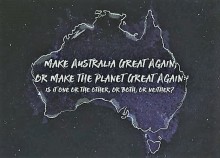MAKE AUSTRALIA GREAT AGAIN, OR MAKE THE PLANET GREAT AGAIN: Is it one or the other, or both, or neither?
Ours is a time of turbulence, but now on a planetary scale. Many in the western world, Australia included, are anxious about the future, unsure where to turn for guidance or inspiration. Some seek to exploit these anxieties, offering black and white explanations of our predicament. For some, the problem is immigration, for others Islamic fundamentalism, or simply Islam. For others still, it is the conspiracy about global warming, or the forces driving globalisation. And so, for them the cure for all our ills is just as simple: cut immigration, or ban Muslims, or keep the coal industry going, or find security in the barrel of a gun. Hence, Trump’s catch cry ‘make America great again’ and Marie Le Pen’s promise of a revolution of ‘patriots’. Australia’s equivalent voices are less well known but no less shrill.
These two lectures focus on Australia: how we see ourselves and ‘others’, how we understand our place in the world, what kind of future we envisage for ourselves and the Earth.
Tuesday 5 September − The questions we need to ask
The first lecture will address some of the critical questions now before us:
- Are we ready to enshrine in our constitution a ‘Voice for Australia’s First Nations’?
- What should be the requirements of Australian citizenship?
- How should we respond to the terrorist threat?
- How can we best engage with Islam and with our Muslim communities?
- What is the appropriate role of religion in the public sphere?
Tuesday 12 September − The choices that await us
The second lecture will argue that reconciling economic and environmental priorities holds the key to Australia’s future.
Conventional wisdom has it that caring for the environment cannot come at the expense of our economic prosperity. Similarly, responding to the challenge of climate change cannot mean placing international obligations above our national interests. But the conventional wisdom may be mistaken. The lecture will canvas other ways of looking at ecological, economic and social well-being – and what this means for the national conversation and our public institutions. We have reached a critical point that calls for a radical rethink not just of policies, but also of institutions – and this includes parliaments, political parties, courts, media, schools and universities.
Bookings essential
For details click here

